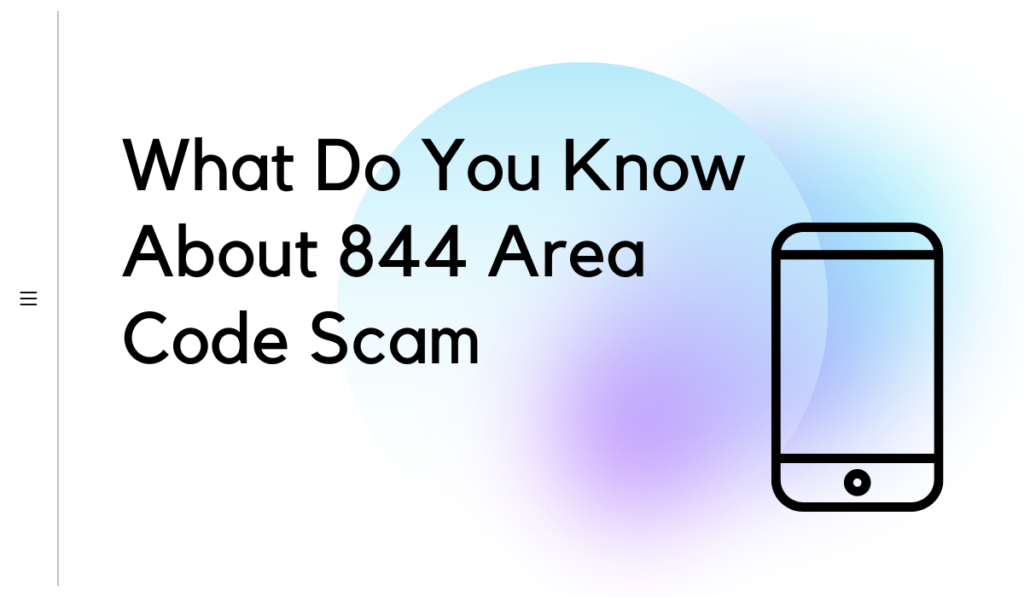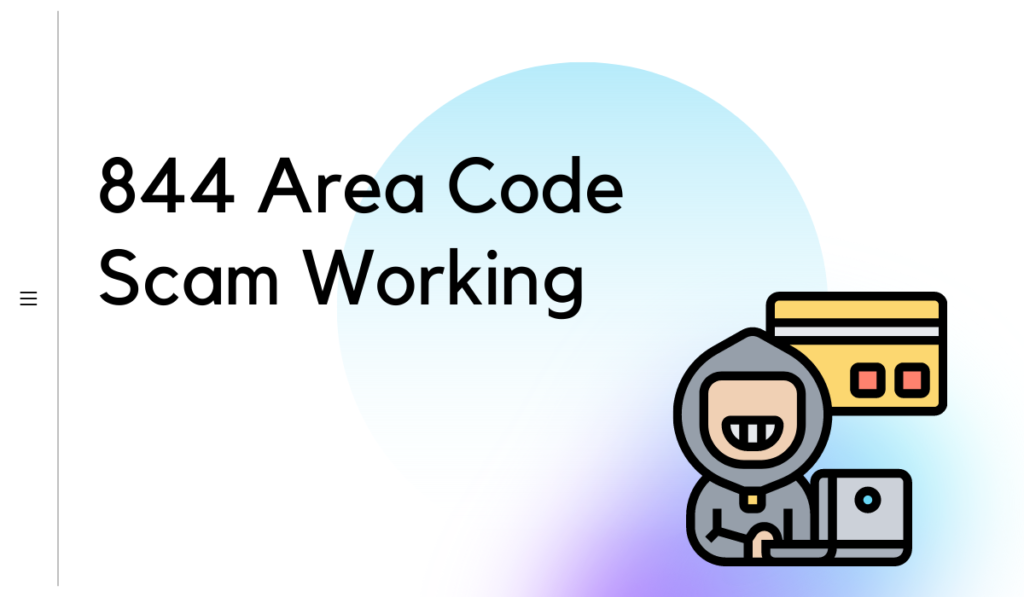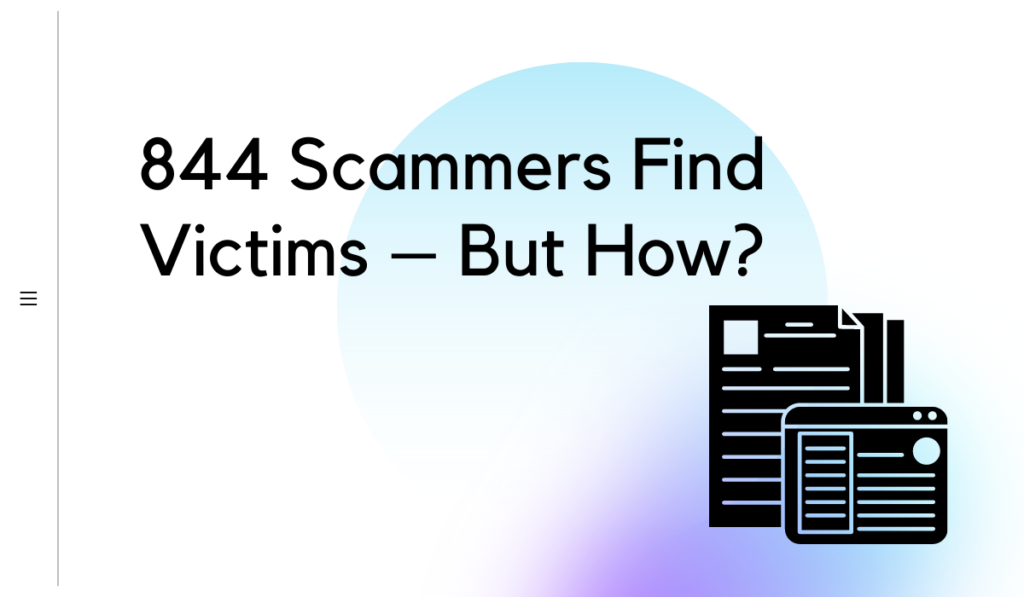1-844 scammer numbers are phone numbers that are used by scammers to trick people into giving them money or personal information. These numbers are often used in a variety of scams, including those that involve fake technical support, debt collection, and other fraudulent activities.

What Is the 844 Area Cod5116e Scam?
The 844 area code scam is a type of scam that uses 1-844 scammer numbers to trick people into giving money or personal information.
One of the most common forms of the 844 area code scam is the technical support scam. In this scam, a scammer will call someone and pretend to be from a legitimate technical support company, such as Microsoft or Apple.
They will then tell the person that their computer has a problem and ask for remote access to fix it. Once they have access, they will either steal personal information or charge the person for unnecessary repairs.
Another form of the 844 area code scam is the debt collection scam. In this scam, a scammer will call someone and claim that they owe money to a company or organization. They will then threaten legal action if the person doesn’t pay up. They will often ask for personal information or payment over the phone.
It’s important to note that some scammers use spoofing technology to make their 1-844 scammer numbers appear legitimate. Spoofing is when a caller disguises their phone number to make it look like they are calling from a different number. This can make it difficult for people to know whether a call is legitimate or not.
To protect yourself from the 844 area code scam and other 1-844 scammer numbers, it’s important to never give personal information or money over the phone to someone you don’t know.
If you receive a suspicious call, hang up and do not call back. It’s also a good idea to use caller ID blocking or call blocking services to block these numbers from reaching your phone. Additionally, you should be aware of common scams and the tactics that scammers use, so that you can recognize a scam when it happens.
844 Area Code Scam Working

Scammers with the 844 area code gather information on their targets before calling to customize their pitch. For example, if they find out about an old credit card, they may pose as a bank collecting a late fee.
In the past, they have pretended to be debt collectors for unpaid loans and demanded payment via credit/debit card or online bank account information. These scammers are known for using intimidating tactics and have been known to call victims’ family and co-workers to increase pressure.
844 Scammers Find Victims – But how?

One-way scammers find victims is through cold calling. Scammers will randomly call phone numbers and try to trick people into falling for their scam. They may also use automated dialing systems to make multiple calls at once, increasing their chances of finding a victim.
Scammers can also find victims through online tactics, such as phishing emails or pop-up ads. They may send an email or a message that appears to be from a legitimate company or organization, asking the person to call a 1-844 scammer number for assistance. They may also use online ads that lead to a fake website or a phone number that is connected to a scam.
Scammers may also use data breaches or other means to obtain personal information and use that information to target potential victims. They may use this information to create personalized scams, making them appear more legitimate.
Another tactic scammers use is to impersonate legitimate companies or organizations, such as technical support providers or debt collectors. They may use 1-844 scammer numbers that are similar to those of the legitimate company to make it harder for people to identify the scam.
It’s important to be aware of these tactics and to be cautious when receiving unsolicited calls or messages. Never give personal information or money over the phone to someone you don’t know and be vigilant about verifying the authenticity of any request for assistance or payment.
Additionally, you can use caller ID blocking or call blocking services to block these numbers from reaching your phone.
How Do I Ignore Getting Involved in This Scam?
One of the most effective ways to avoid getting involved in this scam is to simply hang up the phone when you receive a call from a 1-844 scammer number. Do not engage with the caller or provide any personal information. If the call is legitimate, the person or organization will likely leave a message or call back at a later time.
Another way to avoid getting involved in this scam is to use caller ID blocking or call blocking services. These services can help to block calls from 1-844 scammer numbers, and can be set up through your phone provider or through a third-party app.
You can also be vigilant about verifying the authenticity of any request for assistance or payment, especially if you receive an unsolicited call or message. If you receive a call or message that appears to be from a legitimate company or organization, contact them directly using the phone number or email address listed on their official website to verify the request.
You should also be aware of common scams and the tactics that scammers use, so that you can recognize a scam when it happens. Scammers often use spoofing technology to make their 1-844 scammer numbers appear legitimate, so it is important to be careful when answering calls from unfamiliar numbers.
It’s also important to be suspicious of any request for personal information or payment, especially if the request is made over the phone. Always think twice before giving out your personal information or money, and never provide it over the phone to someone you don’t know.
In summary, to ignore getting involved in the 1-844 scam, it’s important to be aware of the tactics that scammers use, to take steps to protect yourself, like using caller ID blocking or call blocking services, being vigilant about verifying the authenticity of any request for assistance or payment, being aware of common scams and the tactics that scammers use, and being suspicious of any request for personal information or payment, especially if the request is made over the phone.
I’m Also a Victim. What Should I Do?
If you have fallen victim to a scam involving 1-844 scammer numbers, there are several steps you can take to protect yourself and seek resolution.
First and foremost, it’s important to report the scam to the appropriate authorities. You can file a complaint with the Federal Trade Commission (FTC) and/or your state attorney general’s office.
This will help to alert them to the scam and assist them in their efforts to shut down the scammers. It’s also important to contact your bank or credit card company if you have provided any financial information.
You should also take steps to protect your personal information and financial accounts. This may include changing any passwords or PINs that you may have shared with the scammers and monitoring your accounts for any suspicious activity.
If you have lost money as a result of the scam, you should contact your bank or credit card company to try to recover the funds. Some banks have fraud departments that can assist in these cases. Additionally, you can file a complaint with your state’s consumer protection agency, which may be able to help you recover your money.
It’s also important to be aware that scammers may continue to contact you, even after you have reported the scam. They may try to convince you that they are a legitimate company or organization, or that you owe them money.
To avoid falling for their tricks again, it’s best to simply ignore any further contact from them, and not engage with them in any way.
In summary, if you are a victim of a scam involving 1-844 scammer numbers, it’s important to report the scam to the appropriate authorities, take steps to protect your personal information and financial accounts, contact your bank or credit card company to try to recover the funds, and be aware that scammers may continue to contact you, and to ignore any further contact from them.
How Do I Skip Being Targeted for the 844 Scam?
1-844 scammer numbers are phone numbers used by scammers to trick people into giving them money or personal information. To avoid being targeted for this scam, it’s important to take proactive steps to protect yourself.
One way to avoid being targeted is to be cautious when receiving unsolicited calls or messages. Never give personal information or money over the phone to someone you don’t know and be vigilant about verifying the authenticity of any request for assistance or payment.
You can also use caller ID blocking or call blocking services to block calls from 1-844 scammer numbers. These services can be set up through your phone provider or through a third-party app. This will help to reduce the number of unsolicited calls you receive and make it less likely that you will fall for a scam.
Another way to avoid being targeted is to be aware of common scams and the tactics that scammers use. Scammers often use spoofing technology to make their 1-844 scammer numbers appear legitimate, so it is important to be careful when answering calls from unfamiliar numbers.
Additionally, be suspicious of any request for personal information or payment, especially if the request is made over the phone.
You can also register your phone number with the National Do Not Call Registry, which is managed by the Federal Trade Commission (FTC). This will reduce the number of telemarketing calls you receive, but it will not eliminate all unwanted calls, including those from scammers.
It’s also important to be conscious when you are providing personal information online. Be wary of responding to unsolicited emails or text messages, and don’t click on any links or download attachments from unknown senders. Scammers can use your personal information to target you for future scams.
In summary, to avoid being targeted for the 844 scam, it’s important to be cautious when receiving unsolicited calls or messages, use caller ID blocking or call blocking services, be aware of common scams and the tactics that scammers use, register your phone number with the National Do Not Call Registry, and be conscious when providing personal information online.